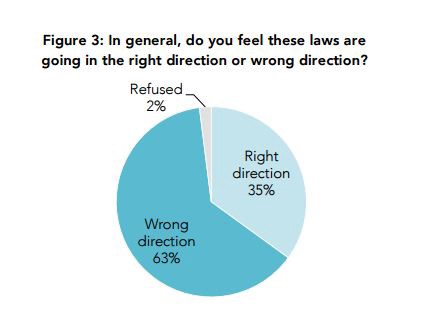Many voters aren’t aware of the state-level assault against abortion access that’s been advancing over the past few years — and once they learn more about the trend, they say they’re opposed to it, according to new polling released this week.
States have passed hundreds of separate restrictions on abortion since 2010. In fact, according to the Guttmacher Institute, a think tank that tracks reproductive health policy, the past five years account for more than one-quarter of all anti-abortion laws passed since Roe v. Wade first legalized the procedure more than four decades ago.
But the new poll, which was commissioned by the National Institute for Reproductive Health (NIRH), found a big information gap here. Fifty-five percent of respondents said they didn’t know about this recent rush of state-level legislation.
In order to get participants up to speed, researchers provided them with information from the Guttmacher Institute detailing the different categories of new state laws that make it more difficult to access abortion:

After receiving this information, most respondents indicated that they disagreed with the recent trend. Nearly two-thirds of participants said these state laws are going in the “wrong direction.” And, when asked to choose one word to describe their reaction to the list of new state restrictions, many chose words like “unfair,” “wrong,” “disgusted,” “ridiculous,” and “angry.”

“There is a misguided assumption that the public is divided on abortion, and that abortion restrictions have the tacit approval of the voters,” Andrea Miller, the president of NIRH, said in a statement. “But when the public learns about the staggering intensity of such laws against abortion, which place women’s safety, autonomy and dignity in jeopardy, they become outraged.”
NIRH’s new research — which was a national survey based on the information the organization previously collected from focus groups in eight different states — takes a different approach to gauging Americans’ attitudes about abortion than traditional polls typically do.
Most major pollsters ask Americans whether they consider themselves to be “pro-choice” or “pro-life.” They also tend to ask respondents whether their beliefs align with one of the following four categories: Abortion should be legal in all cases; abortion should be legal in most cases; abortion should be illegal in most cases; or abortion should be illegal in all cases.
According to NIRH, that line of questioning doesn’t deliver accurate results. It’s been clear for quite some time that Americans’ complicated views on abortion don’t fit neatly into pro-choice and pro-life labels. And questions about abortion’s legality aren’t as relevant to politics or policymaking as questions about abortion’s accessibility — after all, state lawmakers can’t overturn Roe v. Wade altogether, but they can enact an increasing number of restrictions that make it quite difficult for women to exercise the right to choose in practice.
In a previous interview with ThinkProgress, NIRH’s Miller said that finding effective ways to close the information gap about the recent trend in anti-abortion legislation could eventually move voters to take action.
“When people see the current state of affairs, in terms of what kinds of laws are in place and what women need to do if they want to get an abortion, they’re shocked and appalled and they want it to change,” Miller said. “The attacks that have been happening are ultimately an overreach so far beyond where the American public is. Awareness of that overreach, I think, will result in a tremendous power surging forward.”
The results of the new poll hint at this potential future: More than half of participants said they plan to pay close attention to political candidates’ positions on reproductive health issues now that they’ve heard more about the current state landscape.
